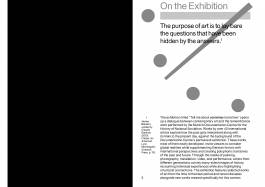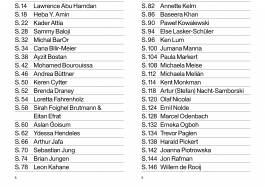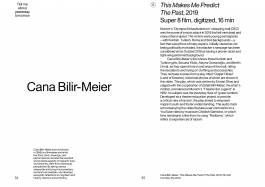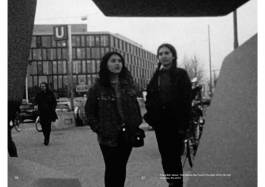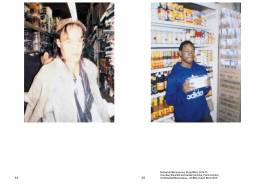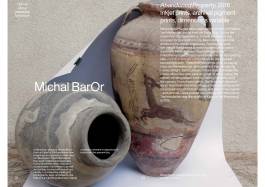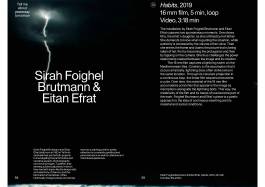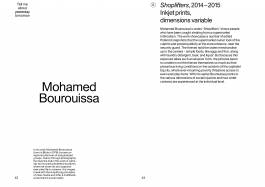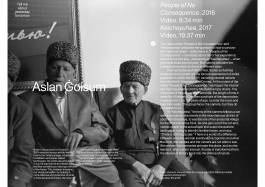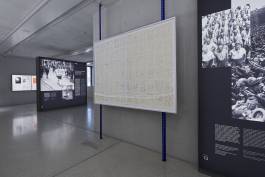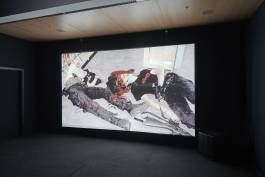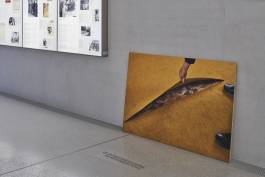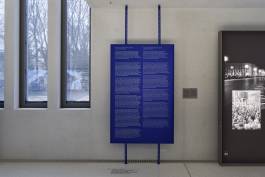Tell me about
yesterday tomorrow
2019–2020 Exhibition
Munich Documentation Centre for the History of National Socialism
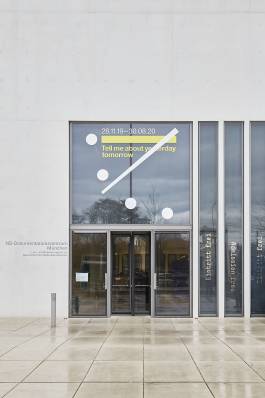
© Connolly Weber
Nov 28, 2019 to Oct 18, 2020
The exhibition titled Tell me about yesterday tomorrow opens up a dialogue between contemporary art and the remembrance work performed by the Munich Documentation Centre for the History of National Socialism.
“The purpose of art is to lay bare the questions that have been hidden by the answers.” (James Baldwin)
Works by over 40 international artists explore how to interpret the past and its links to the present day against the background of the historical exhibition. These works, most of them new, invite viewers to consider global realities of life while supplementing German History with international perspectives and creating polyphonic narratives of the past and future. Through the media of painting, photography, installation, video, and performance, artists from different generations, from the Nazi period to the present day, convey many-sided images of history, recounting individual experiences while also highlighting structural connections. The exhibition features selected works of art from the Nazi period and recent decades alongside new works created specifically for this context.
Historian John Henrik Clarke observed how important history is to our present and future: “History is a clock that people use to tell their political and cultural time of day. It is also a compass that people use to find themselves on the map of human geography. History tells a people where they have been and what they have been, where they are, and what they are. Most important, history tells people where they still must go, what they still must be.” (John Henrik Clarke, 1996)
Historical events and our knowledge about them shape our understanding of our world today and our notions of what may lie ahead. Collective remembrance is closely linked with our experiences of the present day. This makes it impossible to draw a final conclusion. Instead, history must be reexamined and recontextualized in an ongoing process. It is also important to consider who interprets the past, and based on what experiences. Which stories are told, and whose stories are heard – or end up being suppressed, consciously or unconsciously? How do we deal with different voices and ambivalence?
The works of art collected in Tell me about yesterday tomorrow are dedicated to a number of different topics: the resurgence of nationalism, racism, and anti-Semitism; the violent exploitation of humans and the natural world; the cultural and political impact of war, suppression, and trauma; and how national myths are depicted. They testify to how emotions are used to mobilize groups within society, by conjuring up fears and desires and how people are stigmatized as “the Others” while collective narratives are pressed into the service of political ideologies. The exhibition’s international perspective reflects the global dimensions of these critical occurrences.
Fostering a culture of remembrance is crucial to the future of our democracies. It creates awareness not only of the historical conditions that have led to exclusion, degradation, and destruction, but also of our responsibility for ensuring that these processes – created and influenced by people – do not repeat themselves. Now, with right-wing populism and autocratic and fascist tendencies once more on the rise worldwide, reflecting on history is more important than ever. The goal is to develop visions of an open, social way of coexisting based on historical experiences while pointing to the positive values that have arisen since the dictatorship was overthrown – a type of potential that Hannah Arendt called the greatest and most fundamental human capacity: the ability to reconsider, rethink, and create something that has never been before.
Rooted in close cooperation between the fields of art and history, Tell me about yesterday tomorrow addresses the complexity of historiography and offers an opportunity to consider Germany’s past in the context of international developments. As one avenue of political thinking, art supplements historical remembrance work and offers reflections on the meaning and future of shared international remembrance.
Looking back becomes a way of looking ahead. This approach points to what once was and to what may yet be – not to create a simplistic equivalence between historical and current events, but instead to foster awareness of where the similarities lie and what we can learn from historical experience. Thus the exhibition does not offer a self-contained, linear treatment of its subject, but rather draws a complex picture of past and present realities. It also invites viewers to sense the ambivalences present in human actions, along with diffuse tendencies that do not yet have a clear name. Tell me about yesterday tomorrow creates connections between the past, present, and future to remind us that history has an ongoing impact and we should stay aware so that we can recognize similarities before terrible events can recur.
Artists: Lawrence Abu Hamdan, Heba Y. Amin, Kader Attia, Sammy Baloji, Michal BarOr, Cana Bilir-Meier, Ayzit Bostan, Mohamed Bourouissa, Andrea Büttner, Keren Cytter, Brenda Draney, Loretta Fahrenholz, Sirah Foighel Brutmann & Eitan Efrat, Aslan Ġoisum, Ydessa Hendeles, Arthur Jafa, Sebastian Jung, Brian Jungen, Leon Kahane, Annette Kelm, Baseera Khan, Paweł Kowalewski, Else Lasker-Schüler, Ken Lum, Jumana Manna, Paula Markert, Michaela Meise, Michaela Melián, Kent Monkman, Artur (Stefan) Nacht-Samborski, Olaf Nicolai, Emil Nolde, Marcel Odenbach, Emeka Ogboh, Trevor Paglen, Harald Pickert, Joanna Piotrowska, Jon Rafman, Willem de Rooij, Cemile Sahin, Mira Schendel, Gregor Schneider, Hito Steyerl, Diamond Stingily, Rosemarie Trockel, Želimir Žilnik
Curators: Juliane Bischoff, Mirjam Zadoff, Nicolaus Schafhausen
Project Team:
Director: Mirjam Zadoff
Project Manager: Anke Hoffsten
Project Organisation Sonja Eschenbach
Production und Technics: Michael Busam, Josef Köttl, Jürgen Goligowski, Ibrahim Özcan
Architecture Buero Kofink Schels: Simon Jüttner, Sebastian Kofink, Markus Stolz
Design: Boy Vereecken und Antoine Begon
Press and public relations: Kirstin Frieden, Ilona Holzmeier, Thomas Zörr
Education: Nathalie Jacobsen, Dirk Riedel, Thomas Rink, Elisabeth Schulte
Audioguide: Nils Emmerichs, Bernhard Jugel
Contributors: Nils Emmerichs, Andreas Eichmüller
Media partner: Deutschlandfunk Kultur
Partners: Benediktinerabtei St. Bonifaz München, Kulturreferat der Landeshauptstadt München, Programm „Kunst im öffentlichen Raum“, Ludwig-Maximilians-Universität München, Städtische Galerie im Lenbachhaus und Kunstbau München, Zentralinstitut für Kunstgeschichte München
Acknowledgments: We thank all artists, partners, lenders, and supporters who contributed to the success of the project through their creative involvement and generous support.
Funded by the German Federal Cultural Foundation
The project is part of the culture program related to Canada’s Guest of Honour presentation at the Frankfurt Book Fair in 2020. We acknowledge the support of the Canada Council for the Arts and the Government of Canada.
The foregoing texts and images are provided and copyrighted by: https://yesterdaytomorrow.nsdoku.de/
